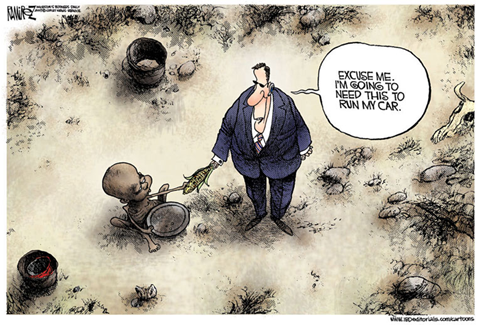By Rebekah Rast –
Here is some food for thought: The amount of grain needed to fill the tank of an SUV with ethanol just once can feed one person for an entire year.
Another hard-hitting fact: The 107 million tons of grain that went to U.S. ethanol distilleries in 2009 was enough to feed 330 million people for one year at average world consumption levels, as stated in an article on Food Freedom’s website.
Still think the federal government’s mandate of ethanol in vehicles is a good idea?
Not only is the federal government’s insatiable appetite for ethanol causing a world food crisis, it has proved itself to be an uneconomical form of energy. An article in the National Review points out, “Ethanol is so uneconomical that Congress supports it three different ways — with a mandate for its use, a tax credit to subsidize it, and a tariff to keep out competitors. Rarely are so many levers of government used to prop up one woeful product.”
Bill Wilson, president of Americans for Limited Government (ALG), is concerned about the apparent disregard the federal government, especially the Environmental Protection Agency (EPA), has for the crisis it is causing by enforcing these ethanol mandates.
“The ethanol subsidy, and the mandates imposed by the EPA, has had the adverse impact of driving up the cost of corn,” he says. “In 2008, food aid budgets were brought to the brink, and food riots broke out in the Third World, because corn got so expensive.”
With 40 percent of the U.S. corn crop now devoted to the government-created demand for ethanol, it is no wonder parts of the world are in upheaval.
ActionAid USA is an organization that works to end extreme poverty and hunger in the world and has come out strongly against ethanol subsidies. In a joint press release with other groups against the use of ethanol and ethanol subsidies, Marie Brill, senior policy analyst for ActionAid USA, said, “With predictions of another food price crisis on the horizon in 2011, Congress should be re-evaluating the costs and benefits of converting food to fuel, instead of approving a $6 billion giveaway to the biofuel industry through VEETC. Adding an ethanol subsidy to the tax package will help break the budget, and it won’t give hungry people the break they need. We cannot afford to spend billions fueling hunger by throwing good taxpayer money after bad biofuels.”
But, with a Renewable Fuels Standard already in place and a $6 billion a year subsidy to gasoline refiners who blend corn ethanol into gasoline, it appears food being converted to fuel is a much higher priority to the federal government and the EPA than the lives of those people in Africa who are now starving to death as a result.
The world has already seen the consequences of this ethanol mandate in action. In Tunisia, skyrocketing food prices caused major food riots and have resulted in the starving of poor peasants throughout the world.
An excerpt from the article on Food Freedom’s website sums up well this devastating effect of the EPA-mandated policy.
“This energy legislation requires a five-fold increase in ethanol use by 2022. Some 15 billion gallons must come from traditional corn-blended ethanol. Nothing like combining PhD models and political corruption to cause worldwide chaos. Ben Bernanke and Charley Grassley have joined forces to bring down the President of 23 years in Tunisia. People tend to get angry when they are starving. Bringing home the bacon for your constituents has consequences. In the U.S. only about 10 percent of disposable income is spent on food. By contrast, in India, about 40 percent of personal disposable income is spent on food. In the Philippines, it’s about 47.5 percent. In some sub-Saharan Africa, consumers spend about 50 percent of the household budget on food. And according to the U.S.D.A., ‘In some of the poorest countries in the region such as Madagascar, Tanzania, Sierra Leone, and Zambia, this ratio is more than 60 percent.’ ”
The government’s interference in America’s free markets by favoring those involved in the process of converting corn to fuel is destroying governments and lives around the world.
“Ethanol is not a wise investment for the U.S. to back,” says ALG’s Wilson. “It is expensive to create and transport and is not an efficient form of renewable energy. Furthermore, it is causing a global food crisis leaving people in other nations starving. No form of renewable energy is worth that cost.”
But the EPA continues to be all for it, even recently deciding that vehicles as old as 2001 are able to use the product.
As the world’s hungriest people go on starving America will be driving around in vehicles full of fuel that could have fed them for an entire year.
How’s that for food for thought?
Rebekah Rast is a contributing editor at Americans for Limited Government (ALG) News Bureau. You can follow her on Twitter at @RebekahRast.







